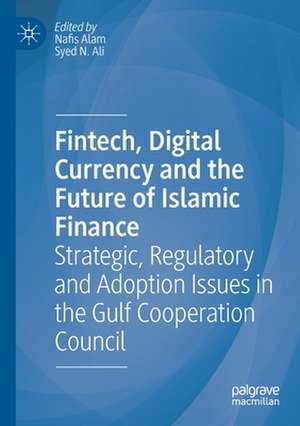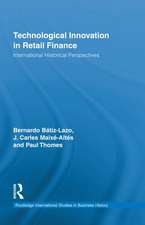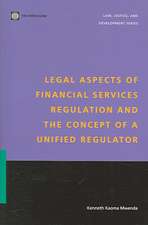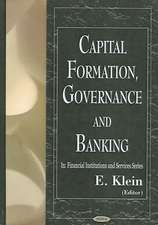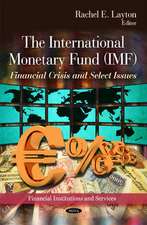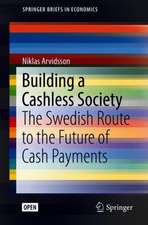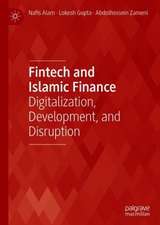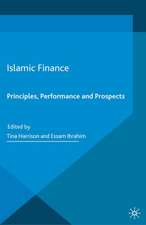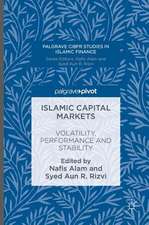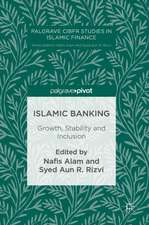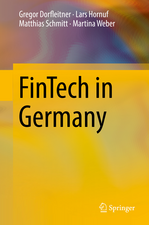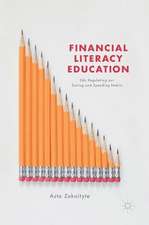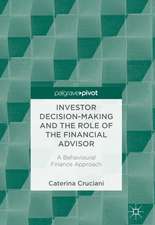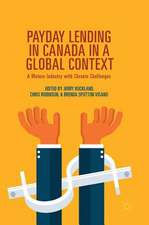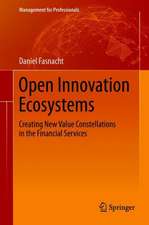Fintech, Digital Currency and the Future of Islamic Finance: Strategic, Regulatory and Adoption Issues in the Gulf Cooperation Council
Editat de Nafis Alam, Syed Nazim Alien Limba Engleză Paperback – 29 noi 2021
| Toate formatele și edițiile | Preț | Express |
|---|---|---|
| Paperback (1) | 778.94 lei 6-8 săpt. | |
| Springer International Publishing – 29 noi 2021 | 778.94 lei 6-8 săpt. | |
| Hardback (1) | 783.05 lei 6-8 săpt. | |
| Springer International Publishing – 29 noi 2020 | 783.05 lei 6-8 săpt. |
Preț: 778.94 lei
Preț vechi: 949.94 lei
-18% Nou
Puncte Express: 1168
Preț estimativ în valută:
149.07€ • 155.06$ • 123.06£
149.07€ • 155.06$ • 123.06£
Carte tipărită la comandă
Livrare economică 15-29 aprilie
Preluare comenzi: 021 569.72.76
Specificații
ISBN-13: 9783030492502
ISBN-10: 3030492508
Pagini: 246
Ilustrații: XIX, 246 p. 36 illus.
Dimensiuni: 148 x 210 mm
Greutate: 0.35 kg
Ediția:1st ed. 2021
Editura: Springer International Publishing
Colecția Palgrave Macmillan
Locul publicării:Cham, Switzerland
ISBN-10: 3030492508
Pagini: 246
Ilustrații: XIX, 246 p. 36 illus.
Dimensiuni: 148 x 210 mm
Greutate: 0.35 kg
Ediția:1st ed. 2021
Editura: Springer International Publishing
Colecția Palgrave Macmillan
Locul publicării:Cham, Switzerland
Cuprins
1. Introduction: FinTech and Islamic Finance in the Gulf Cooperation Council (GCC); Nafis Alam and Syed Nazim Ali.- 2. A Critical Analysis of Bitcoin from an Islamic Legal Perspective; Farrukh Habib.- 3. Combining Islamic Equity Portfolios and Digital Currencies: Evidence from Portfolio Diversification; Abdelkader O. El Alaoui, Amina Dchieche and Mehmet Asutay.- 4. The Application of Smart Contracts to Murabahah Home Financing: Towards an Integrated Model; Mohamed Cherif El Amri, Mustafa Omar Mohammed and Ruslan Sabirzyanov.- 5. The Application of FinTech in Microtakaful as a Means of Digital Financial Inclusion: Insights from the GCC; Muhammad Ashfaq and Najeeb Zada.- 6. Gharar Free Rebittance: Powered by Blockchain; Lokesh Gupta.- 7. Regulatory Issues in Cryptocurrency Usage; Abdolhossein Zameni and Nafis Alam.- 8. Beyond the Jurisprudential Quagmire: Perspectives on the Application of Digital Currencies and Blockchain Technology in Islamic Economics and Finance; EvrenTok.- 9. Does FinTech Revolution Lead to the Disintermediation of Banks? A Study into Islamic Bank Income; Ruhaini Muda, Mohd Saifulizwan Mohd Lateff, Roshayani Arshad, Arif Azhan Rashdan, Ibrahim Abiodun Oladapo and Jaizah Othman.- 10. Utilising Blockchain Technology for Post-trade Securities Settlement: A Framework for Islamic Capital Markets in the GCC Region; Leisan Safina and Umar A. Oseni.- 11. Any Luck with Bitcoin in Saudi Arabia?; Umara Noreen, Zaheer Ahmad, Ohoud Saud Mohammed Alfirm and Nouf Ahmad Hamad Alhomoudi.- 12. Strategic Assessment of Islamic FinTech in GCC Countries; Tariq Gulrez.
Notă biografică
Nafis Alam is Professor of Finance and Head of the School of Accounting and Finance at the Asia Pacific University of Technology and Innovation (APU), Malaysia. His research focuses on FinTech, banking regulation, corporate finance, and Islamic banking and finance. He is a research affiliate of the Cambridge Centre for Alternative Finance (CCAF) at Judge Business School, University of Cambridge, UK, and contributes regularly to a global industry report on FinTech and financial regulation. Nafis previously studied Banking and Finance at Monash University, Australia.
Syed Nazim Ali is Professor and Director of the Center for Islamic Economics and Finance in the College of Islamic Studies (CIS) at Hamad Bin Khalifa University, which is part of the Qatar Foundation. He has spent the last 30 years spearheading interdisciplinary research in Islamic and faith-based initiatives in finance as well as community development. Syed has been the Founding Director of the Islamic Finance Project (IFP) at Harvard Law School, Harvard University, USA, since 1995.
Syed Nazim Ali is Professor and Director of the Center for Islamic Economics and Finance in the College of Islamic Studies (CIS) at Hamad Bin Khalifa University, which is part of the Qatar Foundation. He has spent the last 30 years spearheading interdisciplinary research in Islamic and faith-based initiatives in finance as well as community development. Syed has been the Founding Director of the Islamic Finance Project (IFP) at Harvard Law School, Harvard University, USA, since 1995.
Textul de pe ultima copertă
The banking and financial landscape has been inundated with technology over the last decade, with FinTech, InsurTech and RegTech being just some of the new applications within finance. In the Gulf Cooperation Council (GCC), FinTech is yet to find its feet despite several digital transformation drives initiated by the regional governments in the UAE and Bahrain. In comparison to conventional finance, the use of FinTech within Islamic financial institutions (IFIs) in GCC countries is still in its very early stages. However, the potential disruption that technology may cause for the Islamic finance sector within this region cannot be underestimated. Aiming to highlight, examine and address key strategic, operational and regulatory issues facing IFIs as they make an effort to keep up with the FinTech revolution, this book explores the market positioning, product structure and placement, delivery channels and customer requirements within the GCC market. The authors evaluate the current situation and look forward to future regulation surrounding technology and financial institutions within the GCC. Scholars and students researching Islamic finance and financial technology will find this book an insightful and valuable read, as well as those interested in international finance more generally.
Caracteristici
Uncovers the impact of disruptive technology on the growth of Islamic financial institutions within the GCC region Showcases Shariah and other risk areas associated with FinTech, and evaluates how current regulation is responding Discusses the emergence of Islamic FinTech players in the GCC region, explaining how Islamic banks are working with FinTech startups, locally, regionally and internationally
